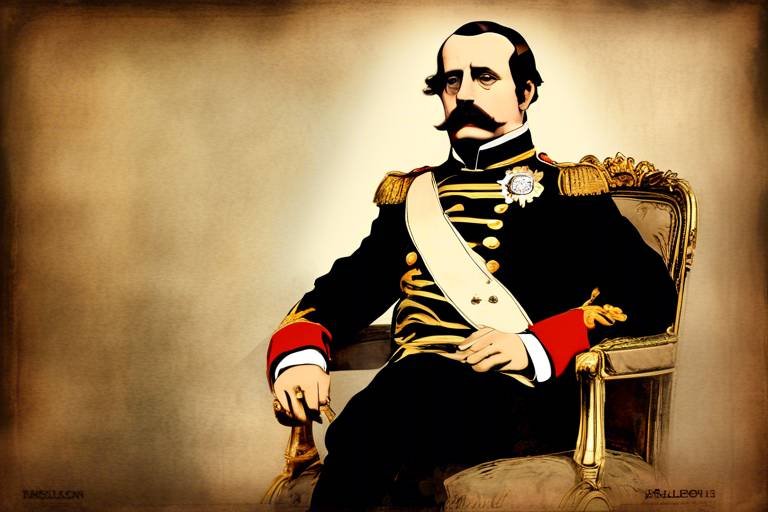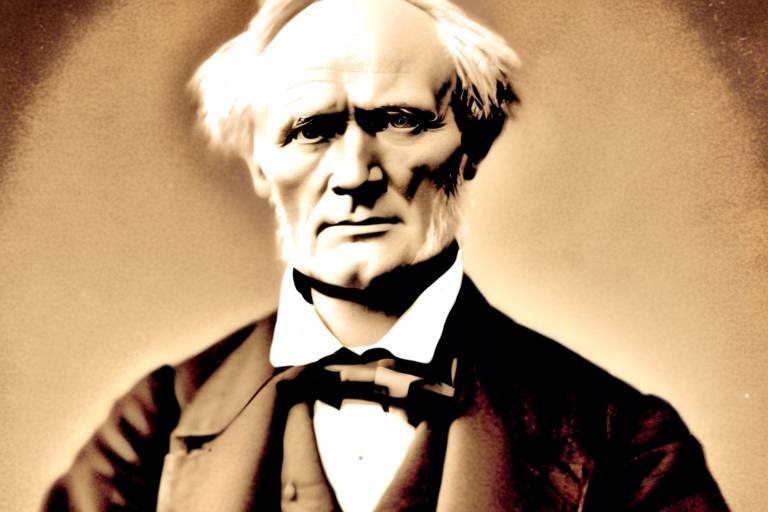Florence Nightingale: The Founder of Modern Nursing
Florence Nightingale, widely regarded as the Founder of Modern Nursing, stands as a beacon of innovation and compassion in the realm of healthcare. Her pioneering work transcended the norms of her time, reshaping the landscape of nursing practice and setting new standards for patient care.
From a young age, Florence Nightingale exhibited a deep-seated passion for helping others, a trait that would define her illustrious career. Her unwavering dedication to improving healthcare stemmed from her formative years and continued to drive her forward as she embarked on her journey into the field of nursing.
During the Crimean War, Nightingale's impact was nothing short of revolutionary. Amidst the chaos of the battlefield, she spearheaded efforts to enhance sanitation, implement proper hygiene practices, and provide compassionate care to wounded soldiers. Her tireless work not only saved countless lives but also paved the way for a new era of nursing excellence.
At the core of Nightingale's nursing philosophy lay a profound emphasis on patient well-being, hygiene, and empathy. She believed in treating each individual with dignity and respect, recognizing the importance of holistic care in promoting healing and recovery.
One of Nightingale's most notable contributions was her innovative use of statistics in healthcare decision-making. By analyzing data and identifying patterns, she was able to implement evidence-based practices that significantly improved patient outcomes and shaped public health policies.
The legacy of Florence Nightingale continues to reverberate through the halls of hospitals and healthcare institutions worldwide. Her principles and teachings serve as a guiding light for modern nursing practices, inspiring a new generation of healthcare professionals to uphold the highest standards of care and compassion.
Despite facing numerous challenges and resistance along her path, Nightingale remained steadfast in her commitment to nursing reforms. Her unwavering resolve and relentless pursuit of excellence propelled her to overcome obstacles and effect lasting change in the healthcare landscape.
Today, as we reflect on the remarkable life and work of Florence Nightingale, we are reminded of the transformative power of dedication and compassion in the face of adversity. Her legacy serves as a testament to the enduring impact one individual can have on an entire industry, leaving an indelible mark on the history of nursing and healthcare.

Early Life and Education
Florence Nightingale, widely regarded as the founder of modern nursing, was a trailblazer whose pioneering work revolutionized healthcare practices. Her tireless efforts and innovative approach to nursing laid the foundation for the principles that continue to shape the field of nursing to this day.
Early Life and Education:
Florence Nightingale was born on May 12, 1820, in Florence, Italy, to a wealthy British family. Despite the societal expectations for women of her time to focus solely on marriage and motherhood, Nightingale pursued her passion for nursing. She received a thorough education in mathematics, philosophy, and science, which greatly influenced her analytical and systematic approach to healthcare.
From a young age, Nightingale demonstrated a keen interest in caring for the sick and vulnerable. Her early experiences in ministering to the poor and sick in her community laid the groundwork for her future endeavors in nursing. Nightingale's determination to challenge societal norms and pursue a career in nursing set her apart as a visionary in the healthcare field.
At the age of 24, Nightingale defied her family's expectations and decided to pursue nursing as her life's work. She received formal training in nursing in Germany and France, where she honed her skills and developed a deep understanding of patient care and hygiene practices.
Throughout her formative years, Nightingale's unwavering commitment to improving healthcare standards and advocating for the well-being of patients shaped her into the iconic figure she would later become. Her early life and education were instrumental in preparing her for the challenges and successes that lay ahead in her remarkable career.

Impact of the Crimean War
Florence Nightingale, a pioneer in the field of nursing, revolutionized healthcare practices. Her work laid the foundation for modern nursing and established principles that are still influential today.
During the Crimean War, Florence Nightingale made a profound impact on nursing and healthcare. She and her team of nurses transformed the unsanitary and chaotic conditions of military hospitals, significantly reducing the mortality rate among wounded soldiers. Nightingale's dedication and innovative approaches to patient care set a new standard for nursing practices.
Her tireless efforts in the Crimean War not only improved the immediate health outcomes of soldiers but also brought attention to the importance of sanitation, hygiene, and compassionate care in healthcare settings. Nightingale's work during the war highlighted the critical role of nursing in promoting recovery and well-being, paving the way for advancements in healthcare practices.
Through her experiences in Crimea, Nightingale demonstrated the vital impact that skilled nursing care and proper sanitation could have on patient outcomes. Her advocacy for better healthcare standards and her commitment to improving the quality of care set a precedent for future generations of nurses and healthcare professionals.
Moreover, Nightingale's efforts during the Crimean War challenged traditional gender roles and perceptions of women in healthcare. By showing exceptional leadership and expertise in a male-dominated field, she shattered stereotypes and paved the way for greater recognition of women's contributions to the nursing profession.
Overall, the impact of the Crimean War on Florence Nightingale's career was profound, shaping her into a visionary leader in nursing and healthcare reform. Her experiences during the war solidified her commitment to advocating for improved patient care, setting the stage for her enduring legacy in the field of modern nursing.

Nightingale's Nursing Philosophy
Florence Nightingale's nursing philosophy was deeply rooted in patient-centered care and compassion. She believed in treating patients as individuals with unique needs and providing them with empathetic and holistic care. Nightingale emphasized the importance of maintaining a clean and hygienic environment to prevent the spread of infections and promote healing.
Furthermore, Nightingale advocated for the professionalism and education of nurses, recognizing the critical role they play in healthcare delivery. She stressed the significance of ongoing training and skill development to ensure that nurses were equipped to provide the highest quality of care to their patients.
In her nursing philosophy, Nightingale also highlighted the ethical responsibility of healthcare providers to advocate for the well-being of their patients and to advocate for social reform to improve the overall health of society. She believed that nurses should be advocates for change and work towards creating a healthier and more equitable world for all.

Statistical Innovations
Florence Nightingale was not only a visionary in nursing practices but also a pioneer in the innovative use of statistics to drive healthcare decision-making. Her statistical innovations revolutionized the way healthcare data was analyzed and utilized, leading to significant improvements in patient outcomes and public health policies.
One of Nightingale's most notable statistical contributions was the use of graphical representations to illustrate the impact of improved sanitation practices on reducing mortality rates. Through her meticulous data collection and analysis, she was able to demonstrate the correlation between clean water, proper hygiene, and decreased infection rates among patients.
By presenting her findings in visually compelling formats such as polar area diagrams, Nightingale effectively communicated complex statistical information to a wider audience, including policymakers and healthcare professionals. This approach not only highlighted the importance of evidence-based decision-making but also paved the way for the widespread adoption of statistical methods in healthcare management.
Furthermore, Nightingale's emphasis on collecting accurate and detailed healthcare data laid the foundation for modern epidemiology and public health surveillance. Her advocacy for standardized record-keeping and systematic data analysis set a precedent for evidence-based practice in healthcare, ensuring that decisions were informed by reliable statistical evidence.
Through her statistical innovations, Florence Nightingale demonstrated the power of data-driven decision-making in improving healthcare outcomes and shaping public health policies. Her legacy continues to inspire healthcare professionals to leverage statistical methods for continuous improvement and innovation in the field of nursing and healthcare.

Nightingale's Legacy
Florence Nightingale's legacy in the field of nursing is nothing short of monumental. Her pioneering work and unwavering dedication have left an indelible mark on healthcare practices worldwide. Nightingale's legacy extends far beyond her lifetime, shaping the very foundation of modern nursing and healthcare systems.
One of the most significant aspects of Nightingale's legacy is her emphasis on patient care and compassion. She believed in treating patients not just as medical cases but as individuals deserving of empathy and respect. This philosophy revolutionized the way nurses interacted with patients, setting a standard of care that continues to be upheld today.
In addition to her focus on patient care, Nightingale's advocacy for hygiene and sanitation has had a lasting impact on healthcare practices. By promoting cleanliness and proper sanitation in healthcare settings, she significantly reduced the spread of infections and improved patient outcomes. Her emphasis on hygiene laid the groundwork for infection control measures that are still in place in hospitals and healthcare facilities.
Furthermore, Nightingale's commitment to data-driven decision-making and statistical analysis has influenced healthcare practices in profound ways. She was a trailblazer in using statistics to evaluate patient outcomes and advocate for healthcare reforms. Her analytical approach to healthcare not only improved the quality of patient care but also paved the way for evidence-based practice in nursing.
The legacy of Florence Nightingale transcends the boundaries of time and continues to inspire nurses and healthcare professionals around the world. Her principles of patient-centered care, hygiene, compassion, and evidence-based practice serve as guiding lights in an ever-evolving healthcare landscape. Nightingale's legacy is a testament to the enduring impact one individual can have on an entire profession and the lives of countless patients.

Recognition and Honors
Florence Nightingale's remarkable contributions to the field of nursing did not go unnoticed, as she received numerous accolades and honors throughout her lifetime. Her dedication to improving healthcare practices and patient outcomes earned her widespread recognition and respect from her peers and the public alike.
One of the most prestigious honors bestowed upon Nightingale was the Royal Red Cross, a decoration established by Queen Victoria in 1883 to recognize exceptional services in military nursing. Nightingale's pioneering work during the Crimean War played a significant role in the establishment of this prestigious award, highlighting her enduring impact on the nursing profession.
In addition to the Royal Red Cross, Florence Nightingale was also the first woman to receive the Order of Merit, a distinguished award recognizing individuals who have made significant contributions to the arts, sciences, literature, or public services. This recognition further solidified Nightingale's status as a trailblazer in the field of healthcare and nursing.
Furthermore, Nightingale's tireless efforts and groundbreaking achievements led to her being honored with the title of "The Lady with the Lamp," a symbolic representation of her compassionate and dedicated nursing care. This iconic image has become synonymous with Nightingale's legacy and continues to inspire healthcare professionals around the world.
Throughout her lifetime, Florence Nightingale received numerous other awards and honors for her exceptional contributions to nursing and public health. Her legacy as the founder of modern nursing remains unparalleled, and her impact continues to be celebrated and honored to this day.

Modern Applications of Nightingale's Principles
Florence Nightingale's principles and teachings have transcended time, shaping modern nursing practices and healthcare policies worldwide. Her emphasis on patient care, hygiene, and compassion continues to be the cornerstone of contemporary healthcare delivery. In today's healthcare landscape, Nightingale's holistic approach to patient well-being remains highly relevant, guiding healthcare professionals in providing comprehensive and compassionate care.
One of the key modern applications of Nightingale's principles is the focus on evidence-based practice. By incorporating research findings and data-driven decision-making into clinical care, healthcare providers can ensure the delivery of high-quality and effective treatments. This evidence-based approach aligns closely with Nightingale's pioneering use of statistics to drive healthcare improvements and underscores the importance of continuous learning and adaptation in nursing practice.
Furthermore, Nightingale's advocacy for improved hospital sanitation and infection control measures has had a lasting impact on healthcare facilities worldwide. In the face of evolving infectious diseases and healthcare-associated infections, Nightingale's emphasis on cleanliness and hygiene remains a critical component of modern healthcare protocols. By implementing rigorous infection prevention strategies, healthcare institutions uphold Nightingale's legacy of prioritizing patient safety and well-being.
Additionally, Nightingale's promotion of interdisciplinary collaboration and teamwork in healthcare settings continues to be highly relevant in contemporary practice. By fostering effective communication and cooperation among healthcare professionals from diverse backgrounds, institutions can enhance patient outcomes and ensure a comprehensive approach to care delivery. Nightingale's emphasis on the collective responsibility of healthcare providers echoes in modern healthcare teams, promoting a patient-centered and collaborative care model.
In summary, Florence Nightingale's principles have endured the test of time, guiding healthcare professionals in delivering patient-centered, evidence-based care. By embracing Nightingale's values of compassion, hygiene, and statistical analysis, modern healthcare systems continue to uphold her legacy and advance the field of nursing in the pursuit of optimal patient outcomes.

Challenges Faced by Nightingale
Florence Nightingale, despite her remarkable contributions to the field of nursing, faced numerous challenges and obstacles throughout her career. One of the primary challenges she encountered was the resistance from traditional medical establishments that were reluctant to accept her innovative ideas and reforms. Nightingale's emphasis on hygiene, sanitation, and patient care was met with skepticism and opposition, as her methods challenged the existing norms of healthcare practices.
Additionally, Nightingale faced gender discrimination and societal expectations that limited women's roles to domestic duties rather than professional pursuits. As a woman in a male-dominated field, she had to overcome prejudices and stereotypes to establish herself as a respected figure in healthcare. Her perseverance and determination in the face of such adversity are a testament to her unwavering commitment to improving healthcare standards.
Furthermore, Nightingale encountered logistical challenges during her work in the Crimean War, where she faced inadequate resources, poor infrastructure, and a lack of support from authorities. Despite these obstacles, Nightingale demonstrated resilience and resourcefulness, implementing innovative solutions to provide quality care to wounded soldiers under challenging conditions.
Moreover, Nightingale's advocacy for healthcare reforms often clashed with bureaucratic resistance and entrenched interests that were resistant to change. Her efforts to introduce evidence-based practices and statistical analysis faced pushback from those unwilling to adopt new approaches. However, Nightingale's persistence and persuasive arguments eventually led to widespread acceptance of her methods and paved the way for modern nursing practices.
In conclusion, Florence Nightingale navigated a myriad of challenges throughout her career, from institutional resistance to societal barriers and logistical hurdles. Her ability to overcome these obstacles and drive transformative change in healthcare exemplifies her enduring legacy as a pioneer in the field of nursing.
Frequently Asked Questions
- Who was Florence Nightingale?
Florence Nightingale was a renowned pioneer in the field of nursing, known for her revolutionary work that laid the foundation for modern nursing practices.
- What were Florence Nightingale's key contributions during the Crimean War?
During the Crimean War, Nightingale and her team of nurses improved sanitation, implemented hygiene practices, and provided compassionate care to wounded soldiers, significantly reducing mortality rates.
- What were the core principles of Florence Nightingale's nursing philosophy?
Nightingale emphasized patient care, hygiene, and compassion as essential components of nursing practice, advocating for the well-being and dignity of all patients.
- How did Florence Nightingale use statistics in healthcare?
Nightingale was a pioneer in using statistical data to analyze healthcare outcomes, identify trends, and advocate for improved public health measures, demonstrating the importance of evidence-based decision-making in healthcare.
- What is Florence Nightingale's lasting legacy in the nursing profession?
Florence Nightingale's legacy includes elevating nursing to a respected profession, setting standards for patient care, and inspiring generations of nurses to uphold her values of compassion and dedication.
- How do Florence Nightingale's principles continue to influence modern nursing practices?
Nightingale's emphasis on patient-centered care, infection control, and evidence-based practice remains integral to modern nursing education and healthcare policies, shaping the quality of care delivered to patients worldwide.



















